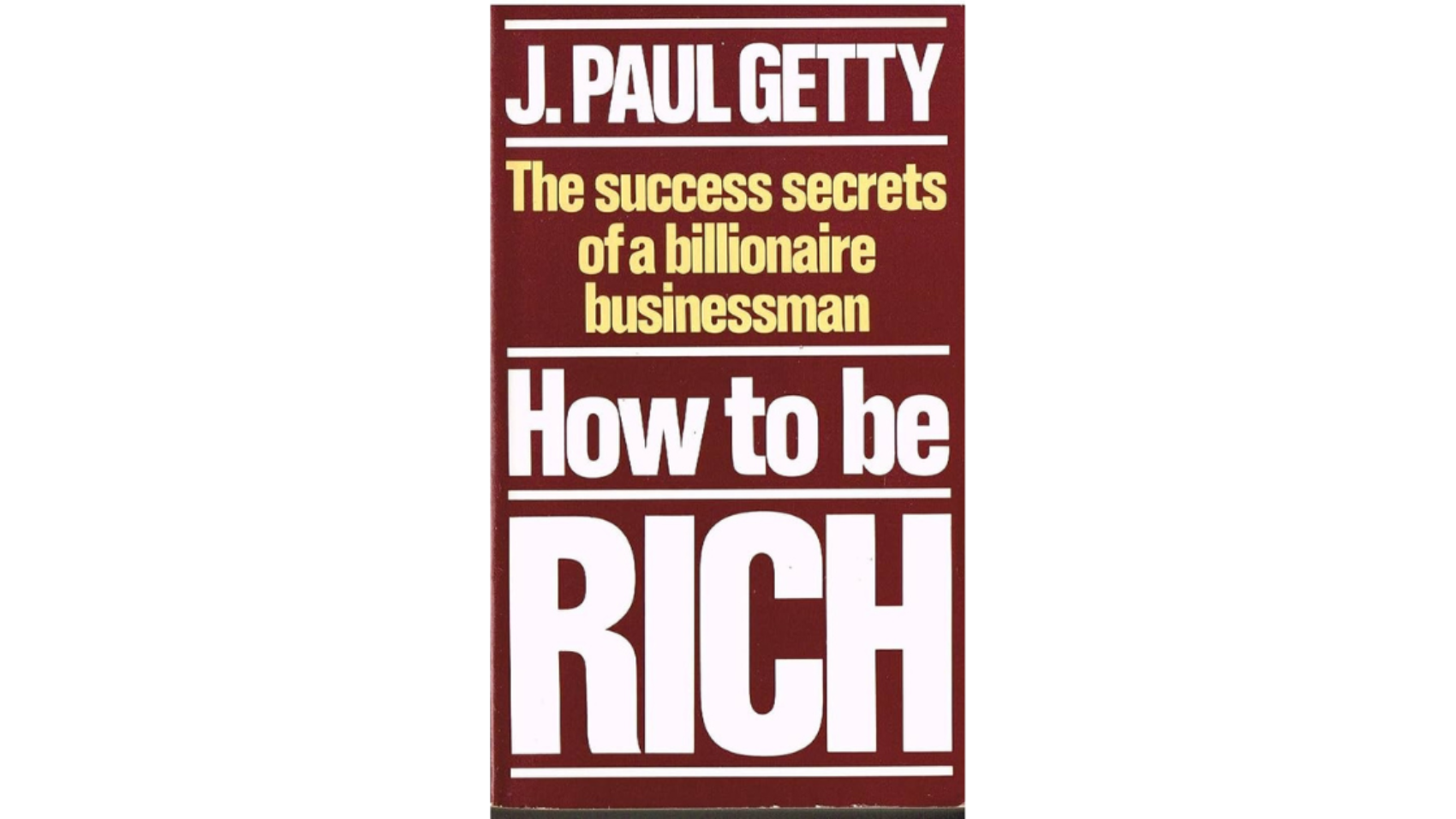American oil mogul J. Paul Getty wrote a book titled “How to Be Rich” that was originally released in 1965. Getty’s ideas on how to amass wealth and succeed in business are outlined in the book.
Getty stresses the value of taking cautious risks, keeping a positive outlook, and having a distinct and well-defined goal. Additionally, he emphasizes the value of hard work, dedication, and ongoing skill development.
In the course of the book, Getty offers guidance on subjects like leadership, investing, and negotiation by drawing on personal anecdotes and ideas from his own experiences in the oil sector. He emphasizes the value of giving back to the community while talking about the necessity of keeping a balanced approach to riches and achievement.
Overall, based on the perspectives of one of the most successful businessmen of the 20th century, the book offers a useful viewpoint on creating wealth and success in business.
The Book in 3 Sentences
- According to J. Paul Getty, anyone may become wealthy if they are prepared to put in the necessary work, take calculated risks, and have a keen sense of timing.
- To attain financial success, Getty emphasizes the significance of living within your means, making good investments, and upholding a strong work ethic.
- The book includes insights into Getty’s own experiences as a prosperous businessman and investor as well as helpful tips on saving, investing, and money management.
Impressions
As this book was written many years ago, it may not be as widely read as some more contemporary finance books. However, based on reviews and commentary from people, some of the most common impressions from the book include:
- Practical advice: People often appreciate the practical advice and tips that Getty provides for building wealth and succeeding in business. Many find the information to be relevant and useful, even several decades after the book was originally published.
- Old-fashioned tone: Some people may find the language and tone of the book to be outdated or old-fashioned. This is likely because it was written in the mid-20th century, and some of the examples and references may not be as relevant to modern people.
- Valuable insights: Despite its age, many people still find the book to be a valuable resource for learning about the mindset and strategies that are important for achieving financial success. Getty’s own experiences and insights can provide inspiration and guidance for those looking to build their wealth.
How I Discovered It
“How to Be Rich” by J. Paul Getty was first published in 1965 and gained popularity through word-of-mouth recommendations, as Getty was one of the richest men in the world at that time. Over the years, the book has remained a popular resource for those interested in building wealth and achieving financial success. It is often widely promoted through online platforms, which is where I found the same.
Who Should Read It?
The book “How to Be Rich” by J. Paul Getty is a classic book on wealth creation, and it can be beneficial for anyone who wants to learn more about building wealth and achieving financial success. However, it is especially relevant for:
- Aspiring entrepreneurs and business owners looking to learn from one of the most successful business people in history.
- Individuals who are interested in understanding the mindset and strategies that are required to accumulate wealth and achieve financial success.
- Anyone looking to learn from the life experiences of a highly successful and wealthy individual.
How the Book Changed Me
After reading “How to Be Rich” by J. Paul Getty, people may undergo various changes depending on how they interpret and apply the insights presented in the book. Some of the changes I had include:
1. Shift in mindset: The book inspired me to adopt a more positive and proactive mindset toward wealth creation. I began to see wealth as something attainable and within my reach, rather than an unattainable dream.
2. Increased motivation: The book also increased my motivation to pursue financial success. I felt more determined to take action and make the necessary changes to improve my financial situation.
3. New perspectives: The book challenged my existing beliefs about money and wealth, and provided me with perspectives and insights that I had not considered before.
4. Improved financial literacy: The book also helped me develop a better understanding of financial concepts and principles, such as investing, saving, and budgeting. This enabled me to make more informed financial decisions and manage money more effectively.
My Top Quotes
- “In times of rapid change, experience could be your worst enemy.”
- “Formula for success: rise early, work hard, strike oil.”
- “Money is like manure. You have to spread it around or it smells.”
- “The meek shall inherit the earth, but not the mineral rights.”
- “Money isn’t everything, but it sure keeps you in touch with your children.”
- “If you can count your money, you don’t have a billion dollars.”
- “The employer generally gets the employees he deserves.”
- “The individual who wants to reach the top in business must appreciate the might and force of habit. He must be quick to break those habits that can break him and hasten to adopt those practices that will become the habits that help him achieve the success he desires.”
- “To succeed in business, to reach the top, an individual must know all it is possible to know about that business.”
- “It is easier to make money than to save it. One is exertion; the other, restraint.”
Detailed Notes//Key Topics
Here are some key topics from “How to Be Rich” by J. Paul Getty:
- Entrepreneurship: The book provides guidance on how to start and run a successful business, including advice on identifying opportunities, managing finances, and developing a winning mindset.
- Risk-taking: Getty emphasizes the importance of taking calculated risks in business, and shares his own experiences with risk-taking, both successes and failures.
- Money management: The book covers various aspects of money management, including budgeting, saving, and investing. Getty stresses the importance of frugality and sound financial planning.
- Leadership: Getty discusses the qualities that are necessary for effective leadership, including vision, communication skills, and the ability to inspire and motivate others.
- Persistence and resilience: Getty emphasizes the importance of persistence and resilience in achieving success, and shares his own struggles and setbacks on the path to wealth and success.
- The oil industry: The book provides insights into the oil industry, including the history of the industry and the opportunities and challenges it presents for entrepreneurs.
- Personal development: The book emphasizes the importance of personal development in achieving success, including developing positive habits, staying informed, and continuing to learn and grow throughout one’s life.

